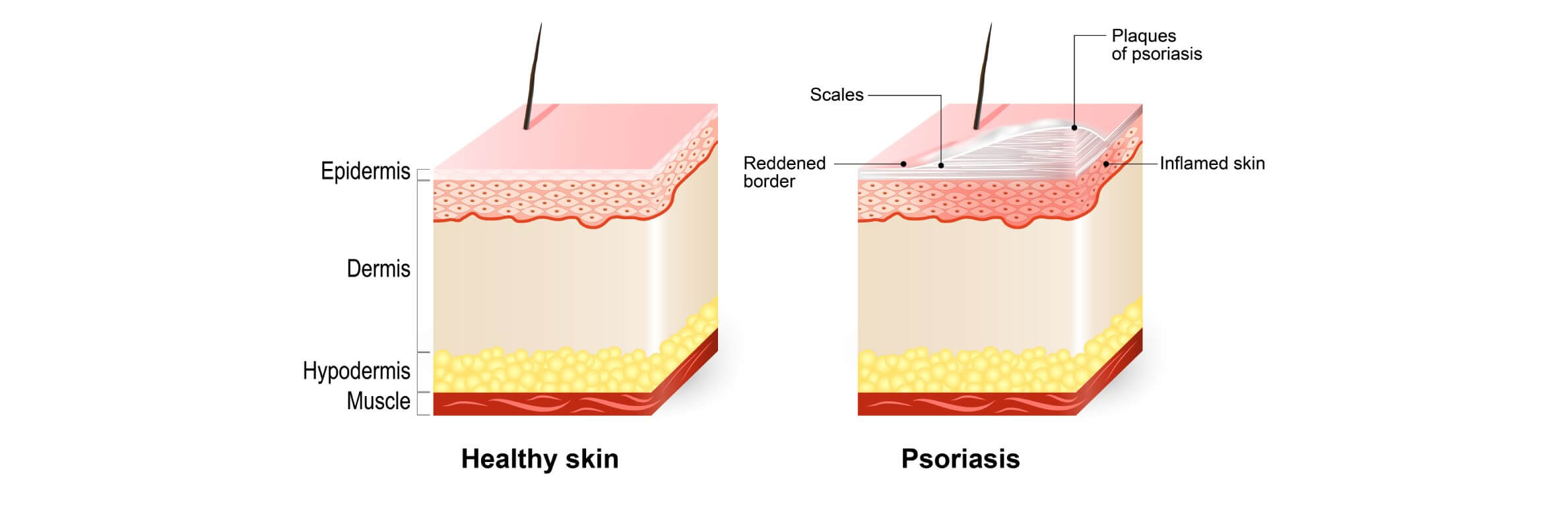Dendritic cells for psoriasis play a leading role in the development of the disease. By influencing this link in pathogenesis, physicians can improve treatment outcomes by using dendritic cells in addition to standard therapy. So far, this is an experimental treatment method, but some clinics in Germany are already using it. If you want to take advantage of the latest advances in medicine and undergo a novel psoriasis treatment, you can seek medical help from one of the specialized German centers. The Booking Health specialists will assist you in finding the most suitable hospital and take care of all the arrangements for your trip.
What is psoriasis?
Psoriasis is a chronic skin inflammation that may sometimes also affect other tissues and organs. The condition is associated with an autoimmune mechanism. This is an extremely common pathology. In different regions throughout the world, the disease affects up to 1-5% of the population.
In standard cases, patients with psoriasis have silver-colored plaques covered with scales on their skin. The main localizations of the rash are the scalp, extensor surfaces of the limbs in the area of large joints, and lower back. The rash may also appear anywhere else.
The disease cannot be cured, so therapy is aimed at eliminating exacerbations and improving the quality of life. Standard treatment for mild forms of psoriasis includes only topical agents, while moderate and severe forms of the disease require systemic therapy. A treatment regimen may include retinoids, immunosuppressants, biological therapy, or phototherapy. All medications are toxic, so they are used in short courses.
Standard treatment may not be effective enough for some patients, or it may be contraindicated due to comorbidities. In such cases, you can take advantage of new directions in the fight against this disease, for example, by undergoing dendritic cell psoriasis therapy.
What are dendritic cells?
Dendritic cells are immune cells that perform an antigen-presenting function. These show other immune cells, which targets in the body to attack.
Dendritic cells are large and have many processes. They are formed in the bone marrow. Doctors obtain dendritic cells from monocytes or bone marrow progenitor cells using growth factors in the laboratory.
In the human body, dendritic cells enter the systemic circulation, and from there they get into all organs and tissues, where they are in an immature state. In contact with viruses or other pathogens, they absorb foreign particles and recognize antigens in them using toll-like receptors (TLRs). The dendritic cell maturation process then begins, with their simultaneous migration to the lymph nodes. A mature dendritic cell can no longer capture new antigens, but it is able to produce cytokines (inflammatory molecules). And most importantly, when getting into the lymph nodes, dendritic cells show antigens converted to peptides by T helper lymphocytes. As a result, T lymphocytes learn to recognize a specific antigen and attack the source of the disease.
Dendritic cells are the cause of psoriasis
The skin contains a huge number of dendritic cells. There are more of them here than anywhere else. And there are different types of tolerogenic dendritic cells:
- Epidermal Langerhans cells
- Bone marrow-derived dermal conventional dendritic cells
- Plasmacytoid dendritic cells
- Inflammatory dendritic cells
As the main cellular source of alpha interferon, tumor necrosis factor alpha, interleukin-17, and interleukin-23, dendritic cells play a key role in the development of psoriasis. It is interleukins that are to blame for the abnormal maturation and excessive division of keratinocytes, cells of the stratum corneum of the epidermis.
Patients with psoriasis get caught in a vicious circle. On the one hand, dendritic cells produce substances that cause keratinocytes to mature improperly and divide rapidly. On the other hand, keratinocytes themselves perform immune functions. They secrete substances that promote the activation of dendritic cells. As a result, two types of cells stimulate each other, supporting the inflammatory process and causing the appearance of rashes on the skin.
Dendritic cells in the skin of patients with psoriasis
Patients suffering from psoriasis have elevated levels of dendritic cells in the skin.
Plasmacytoid dendritic cells . The levels of these cells become too high not only in the affected skin but also in healthy skin. They trigger the exacerbation of psoriasis by producing tumor necrosis factor alpha. It is an interesting fact that doctors conducted studies during which they tried to use monoclonal antibodies against this factor but did not get any positive effect. It turned out that tumor necrosis factor alpha is important for triggering, but not maintaining, inflammation.
Dermal dendritic cells . These cells are present only in the affected skin, and they are almost absent in normal skin. They produce many cytokines and play a leading role in maintaining inflammation in psoriasis. The skin contains three subgroups of dermal dendritic cells, including inflammatory dendritic cells.
Langerhans cells . The role of these dendritic cells in psoriasis is unknown. Some studies show that they exacerbate inflammation through the production of interleukin-23, while others show a decrease in skin inflammation under the influence of Langerhans cells.
How is psoriasis treated with dendritic cells?
Each patient receives personalized preparations made from dendritic cells. In medicine, autologous (the patient's own) dendritic cells are used because they are safe. The use of such cells usually does not cause any side effects, including severe immune reactions.
For the treatment of psoriasis in Germany, dendritic cells can be collected from the patient's bone marrow or from their peripheral blood. Dendritic cells mature from progenitor cells or monocytes. Their production in the laboratory is facilitated by granulocyte-macrophage colony-stimulating factor and interleukin-4 added to the biomaterial taken from the patient. Tumor necrosis factors and other drugs are used to induce dendritic cell maturation.
Dendritic cells are trained to resist disease. Antigens are added to them, training them to attack certain targets. Once dendritic cells are administered into the patient's body, these antigens will also be studied by T cells. This will lead to immune response normalization.
When treating psoriasis, dendritic cells are injected into a patient's vein. Several such procedures may be required to achieve a good therapeutic result. The number of injections, intervals between infusions, and optimal number of dendritic cells have not yet been determined. The treatment method is not standardized, so different hospitals use different approaches based on the experience of previous use. The specialists from the Booking Health company will help you select the most suitable hospital that uses dendritic cells in psoriasis treatment and achieves good results.

When should you use dendritic cell therapy for psoriasis?
Like other experimental methods, dendritic cell therapy is used in situations where standard treatments:
- Do not work
- Cannot provide the effect that will be fast enough and strong enough
- Cannot be used due to contraindications
- Turned out to be too toxic, so the treatment had to be stopped due to complications or poor tolerance
Dendritic cells are used during periods of exacerbations. They help patients get better results with fewer side effects.
Psoriasis DC vaccines can be used not instead of but in addition to standard therapy. Most often, this approach is used in patients with resistant and severe forms of psoriasis. Dendritic cells reduce inflammation not only in the skin but also in other organs and tissues, including joints. They help patients relieve the symptoms of psoriatic arthritis.
Where to undergo dendritic cell therapy for psoriasis?
Dendritic cells have begun to be used for psoriasis relatively recently. Therefore, it will be difficult for you to find psoriasis therapy clinics even abroad.
You are welcome to use the services of the Booking Health company to undergo your treatment in Germany. We know which clinics use advanced methods of therapy, and we will select the most suitable medical center for you. You will be able to use unique methods of treating diseases that are available only in advanced hospitals.
When you make your treatment appointment through the Booking Health service, the prices for you will be lower than when you contact a foreign medical center directly. The average cost of treatment in Germany will be lower due to the absence of additional taxes for foreign patients. You will receive insurance that will cover expenses not covered by your medical care program. In addition, when you make your treatment appointment through Booking Health, treatment abroad will become much easier and more convenient for you because we will fully organize your trip.
Frequently Asked Questions
Send request for treatmentAuthors:
This article was edited by medical experts, board-certified doctors Dr. Nadezhda Ivanisova, and Dr. Bohdan Mykhalniuk. For the treatment of the conditions referred to in the article, you must consult a doctor; the information in the article is not intended for self-medication!
Our editorial policy, which details our commitment to accuracy and transparency, is available here. Click this link to review our policies.
Sources:
Journal of Allergy and Clinical Immunology
Read:
Article menu:
Don't know where to start?
Contact Booking Health






